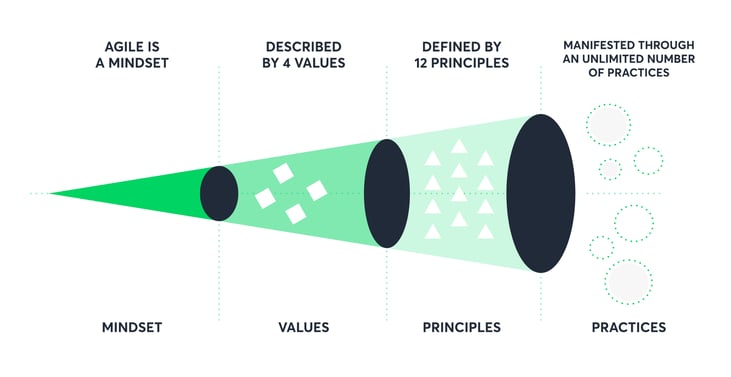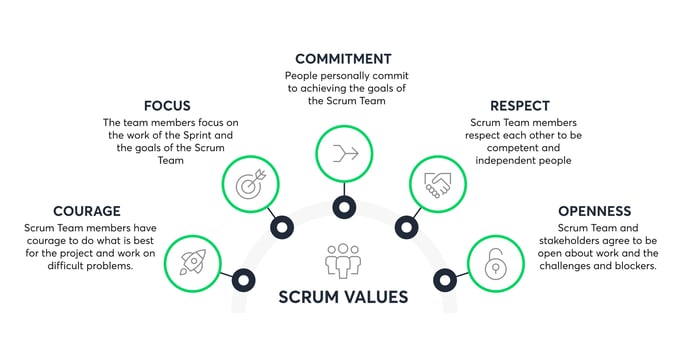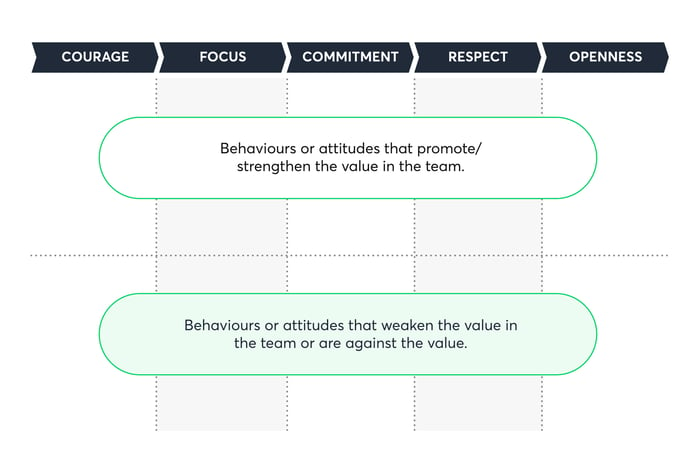Understanding the Power of Scrum Values for Your Team

Contents
When we hear “Scrum” we tend to think about events, roles, and artifacts.
But relatively rarely we are talking about Scrum foundations — its pillars and values.
This article aims to draw your attention to the five Scrum values that are the basis of the Scrum framework. These values are internal qualities that guide team member behavior and are critical to the success of a Scrum project. They boost collaboration and increase the odds of project success, forming the foundation on which the Scrum framework is built.
Agile — from a mindset to practices within the Scrum framework
How should Agile be perceived? As a mindset, an approach to developing products. Unfortunately, we very often limit ourselves to discussing techniques, practices, frameworks, etc. That’s why the implementation of Agile in organizations frequently looks like a typical Cargo Cult.
We tend to reduce Scrum to the numbers 4–3–3, comprising of 4 major meetings (events), 3 roles (responsibilities), and 3 artifacts.

Scrum values
An essential aspect of Scrum is iterative development, which emphasizes the need for the Scrum Team to continuously review and improve their process after every Sprint.
Successful use of Scrum depends on people becoming more proficient in living the five values:
-
Commitment: The Scrum Team commits to achieving its goals and to supporting each other.
-
Focus: Their primary focus is on the work of the Sprint to make the best possible progress toward these goals.
-
Openness: The Scrum Team and its stakeholders are open about the work and the challenges.
-
Respect: Scrum Team members respect each other to be capable, independent people, and are respected as such by the people with whom they work.
-
Courage: The Scrum Team members have the courage to do the right thing, and to work on tough problems.
These values give direction to the Scrum Team with regard to their work, actions, and behavior. The decisions that are made, the steps taken, and the way Scrum is used should reinforce these values, not diminish or undermine them.
The team members learn and explore the values as they work with the Scrum events and artifacts. When these values are embodied by the Scrum Team and the people they work with, the empirical Scrum pillars of transparency, inspection, and adaptation come to life building trust.
Scrum values
As you are probably aware, instilling values is much more difficult than introducing events or using given artifacts. Why is that? Because we have to change mindsets, attitudes, and behaviors, not only day schedules or tools. This is a long-term and uneasy process. However, it pays off — Scrum teams working in line with those values can achieve great results.
One key aspect of this is empirical process control, which allows the Scrum Team to adapt and change based on circumstances, rather than relying on a pre-made upfront plan.
But how to do that? Maybe you’ll find some tips from Dave West’s article helpful:
-
Values like anything in Scrum need to be both visible and inspected and adapted on.
-
Put the values on a wall and have each team member write up how they are going to demonstrate the value in their working day.
-
Add a “values moment” to your retrospective. This gives everyone an opportunity to inspect and adapt on their values.
-
Introduce a “values” prize. Not a serious prize, but a fun prize that sometimes can be delivered to two people or the whole team when a value has been demonstrated and everyone is aware of it.
-
The “whoops we dropped the value” prize provides a way of demonstrating courage, but also highlighting when we missed a value. Of course, this prize could end up being a very negative thing so it should always be delivered in a fun way without negative implications.
-
Getting external managers or stakeholders to demonstrate to the team a value and what it means to them.
In the section below I describe the idea of a “Scrum Values retrospective,” which may be valuable as well.

Commitment
The Scrum Team commits to achieving its goals and to supporting each other. The general definition of “commitment” is “the state or quality of being dedicated to a cause, activity, etc.”
This describes exactly how commitment is intended in Scrum. Commitment is about dedication and applies to both the actions and the intensity of the effort. The Scrum Master plays a crucial role in ensuring adherence to Scrum values, principles, and framework.
It is not about the final result, as it is often uncertain and unpredictable for complex challenges in complex circumstances. Thus, the “commitment” cannot be seen as a hard-coded promise/contract.
Why is commitment important?
The commitment is important especially when people perform mental and creative work (like coding, testing writing system requirements, etc). All of “Taylor's methods” (Frederick Winslow Taylor), created for measuring and tracking people’s work, cannot be applied here, nor the “command and control” management style.
Team members have to be committed (devoted) to the work they are doing, to the team, to the quality, to Sprint and Product Goals, to acting as professionals, etc., and only afterward can they deliver great results.
Commitment is crucial during the whole Sprint, but it also helps the team establish an achievable Sprint Backlog during Sprint Planning meetings.
How to achieve it within a team?
It might sound trivial but if you want team members to be committed, they must see the value and profound sense in their work. Make the business value of the project visible for the whole team by asking client reps, product owners, and real users how delivered software, a new feature, or an adjustment in the application helps them in their daily work, increases their efficiency, eliminates obstacles, etc.
This can create motivation to deliver more, and motivation is a key to commitment.
Focus
The primary focus is on the work of the Sprint to make the best possible progress toward these goals.
What goals does the Scrum Guide refer to? Sprint goal? Product goal? If you read the whole paragraph from the SG you will surely notice that it refers to the Scrum Team goals.
The major purpose of the Scrum Team is creating value through the developing product and, of course, both the Product Goal (in a long term) and the Sprint Goal (in a short term) to help stay focused on the main team goal.
The timeboxing of Scrum encourages the players to focus on what’s most important now without being bothered by considerations of what might stand a chance of becoming important at some point in the future. Adhering to the core values and principles of the Scrum methodology is crucial for the successful implementation of the Scrum framework in project management.
Why is focus important?
Focus nowadays is probably one of the most desirable and hard-to-achieve attitudes in our dynamic and ever-changing world. Slack messages, emails, phone notifications, social media, and many other tools have a considerable impact on our work and focus. Working from home can also constitute a significant distractor for some of us (especially during lockdown).
On the other hand, focus is vital if we strive to deliver high-quality mental work. Without proper focus, we may “burn down” working hours without delivering valuable, tangible results.
How to achieve it within a team?
If you are looking for a source of knowledge about focus, concentration, and efficient work, Deep Work, by Cal Newport is a must-read. You will learn a lot about how to stay focused in our distracting world.
Also, you may find these pieces of advice useful:
- Set a “focus time” for the whole team — a time-block within a working day without meetings, when no one is expected to read Slack messages and be responsive.
- Discuss (for example, during the Retrospective meeting) what the distractors are for the team and how to avoid/eliminate/reduce them.
- Keep reminding the team about the Sprint Goal and Product Goal (if they are present in your project).
- Try out a “Pomodoro” technique.
Openness
The Scrum Team and its stakeholders are open about the work and the challenges. Transparency is one of the Scrum pillars, and openness is vital to achieving that.
It is necessary to follow the six Scrum principles, which are essential guidelines for applying the Scrum framework, and they must be distinguished from Scrum values.
Why is openness important?
Openness is essential for good cooperation, and good cooperation is key when it comes to developing and delivering high-quality products using the Scrum framework.
All team members and all stakeholders should be open about their work and progress but also their problems. What is more, openness is critical when sharing feedback and learning from others.
How to achieve it within a team?
Build an environment where people feel free to share their thoughts, ideas, and viewpoints. Always be open and honest with others, as it will encourage them to do the same. Never criticize, shout, or punish someone who has a different opinion (even if they are most probably wrong).
Respect
Scrum Team members respect each other to be capable, independent people, and are respected as such by the people with whom they work.
Scrum masters play a crucial role in fostering respect, focus, courage, and commitment within the Scrum teams through their actions and leadership.
Why is respect important?
Respect is strongly connected to Openness (discussed above) — frankness without respect may lead to rudeness. Every team or community (not only within the Scrum framework) needs to respect varying opinions and the opposite points of view, but also different personalities, cultural backgrounds, etc.
We also have to respect changes introduced by the client, or their decisions regarding how to build and develop the product.
How to achieve it within a team?
As a PM or an SM, you should be a role model for others to follow! Listen carefully to what others have to say and when disagreeing, voice your opinions with respect and kindness.
If a team member shows disrespect to others — confront this person in a one-on-one conversation. It might be a huge challenge when the client rep doesn't respect people in the project, but under no circumstances should we ever turn a blind eye to that.
Highlighting particular examples and situations how their behavior affected the team is critical for solving the issue (the discussion may be tough, so prepare carefully and ask your Account Manager or an HR Business Partner for assistance).
Courage
Scrum Team members have the courage to do the right thing, and to work on tough problems.
Understanding the five core Scrum values is essential for every Scrum team member, as it highlights the importance of personal responsibility and the role of team members in reaching their full potential within the Scrum framework.
Why is courage important?
It takes courage to challenge others' opinions (of course, respectfully) but it is crucial to voice our opinion or concerns when we have them. Admitting that we made a mistake also takes guts, and courage is needed to guard one’s values and principles.
How to achieve it within a team?
Show courage in your daily work and foster it in your team members. If someone is rather shy, make room for their opinions during a discussion. Remember to be supportive and encouraging when supporting team members to get out of their comfort zones — for example, ask them to facilitate a meeting like a Retrospective or a Sprint Review.
Scrum values
I found it very useful when I conducted this kind of retrospective with many of my teams. The whole exercise takes between 1 to 1.5 hours. All you need is a Miro board (or even Google Sheets) and Google Meet with a breaking rooms option.
- Prepare an easy retro board like the one below:

Here you can find a ready template for Scrum Values.
- Split the participants into five breakout rooms (you can use Zoom or Google Meet for the online meeting) — every subteam will be working on a different value.
- The goal is to put a post-it for every value with behaviors or attitudes that promote/strengthen the value in the team, or that weaken or preclude the value in the team (15 min timebox should be sufficient for this part).
- Bring everyone to the common room again, and discuss your findings and thoughts — do you find some of the good behaviors in your team? Maybe there is something you should get rid of?
- Finish the retrospective with a summary and some action points relevant to your team.
Actionable Tips and Techniques based on Scrum principles
To truly embody and reinforce the Scrum values within your team, it is essential to incorporate practical and structured methods. Below are some actionable tips and techniques, divided into practical exercises and useful templates and tools, that can help your team internalize and live these values in their daily work.
Practical Exercises
To effectively instill Scrum values within your team, consider incorporating actionable exercises and workshops tailored to each value. For instance, organize team-building activities that emphasize commitment by setting group objectives and tracking their progress together.
Reflective exercises, such as individual journaling or group discussions, can help team members understand and embody the value of courage by sharing experiences where they faced challenging situations.
Similarly, focus exercises like the ‘Deep Work’ sessions mentioned earlier can be structured around eliminating distractions and enhancing concentration on Sprint goals. Incorporating role-playing scenarios can also be beneficial, where team members practice openness by giving and receiving feedback in a controlled environment.
Templates and Tools
Providing teams with practical tools and templates can facilitate the integration of Scrum values into their daily routines.
Develop and offer a downloadable Scrum values checklist that teams can use to self-assess and reflect on their adherence to these principles. A retrospective template focusing on Scrum values can guide teams through regular evaluations of how well they are embodying each value, prompting specific discussions and action plans.
Additionally, creating a visual aid, such as a poster or digital dashboard displaying the Scrum values and related behaviors, can serve as a constant reminder and reinforcement for the team. These resources not only support the learning process but also ensure that the values remain visible and integral to the team’s workflow.
